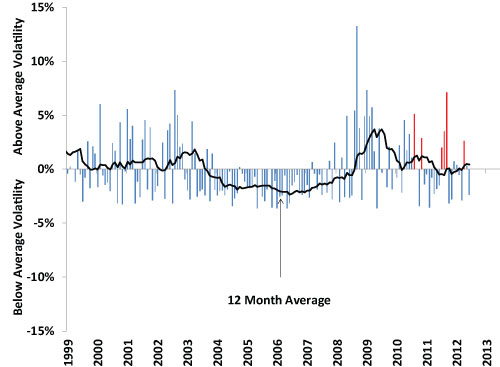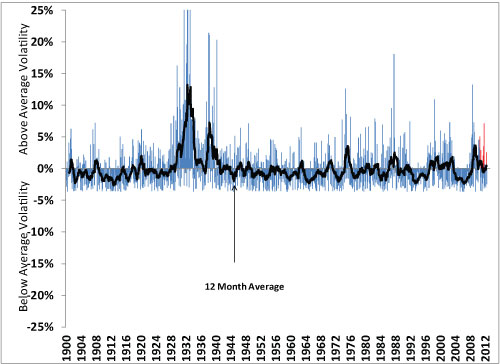Personal Wealth Management / Market Analysis
Volatility and Mind Tricks
Don’t let your short term memory impact your perception of volatility.
Today’s stock market seems quite volatile, and perhaps this has been keeping some long-term investors from investing in equities—which is a shame, since equities are overall the best performing liquid asset class over long time periods. But it’s true: Measured daily, the S&P 500 has been more volatile lately than its historical average over the last 30 years.
Unless you’re a day trader, though, you shouldn’t pay much attention to daily volatility. Long-term investors by definition have a time horizon longer than a single day—typically many years, if not decades. In that context, measuring longer-term volatility is much more relevant.
Looking at monthly volatility instead, we can see the average monthly swing of the S&P 500 over the last 30 years has been about 3.5%—which means in any given month, the S&P 500 swings either 3.5% up or down, on average. Exhibit 1 plots monthly volatility versus average volatility over time. A reading above zero represents higher-than-average volatility, and vice versa. Notice how volatility has been decreasing, on average, since 2009—more specifically, only six months in the last two years had meaningfully higher-than-average volatility.
To be sure, 2011’s correction drove a few volatile months, but it was overall a pretty average year—just like 2012 has been thus far. 2008 and 2009 were clearly volatile years, but don’t let high volatility three to four years ago make you ignore the subsequent reduction in volatility. Said differently, bear markets and initial stage bull markets are nearly always volatile—there’s just nothing unusual or game-changing about this latest instance.
Exhibit 1: S&P 500 Monthly Volatility 1999-2012 (% deviation from long-term average)
Source: Global Financial Data, 01/1900 – 07/2012, S&P 500 Price Returns.
So why do stocks feel so volatile, if that doesn’t seem to be the case looking at the data?
Human emotions are fickle and often skewed by the barrage of information coming from a 24-hour news cycle and the ready availability of information on demand. This could explain some of the increased daily volatility—or even just our perception of volatility—but I believe something else explains the way we feel about the market’s recent volatility: our short-term memories.
During the mid-2000s, we witnessed an extended period of abnormally low volatility. The market moved significantly higher with little gyration along the way—it was a period of low volatility matched just a few times in over 100 years. Our minds secretly (or overtly) yearn for this type of market activity consistently—but we simply don’t remember the low volatility in the 2000s was much more an anomaly than the norm. As you can see in Exhibit 2, volatility today is higher than it was in the mid-2000s but not too terribly different from what we’ve witnessed over the last century.
Exhibit 2: S&P 500 Monthly Volatility 1900-2012 (% deviation from long-term average)
Global Financial Data, 01/1900 – 07/2012, S&P500 Price Returns
As long as you’re a long-term investor, try not to sweat the market’s short-term gyrations, challenging though that no doubt is—focus more on the long term, and don’t let your mind make you believe stocks are more volatile than they are. Failing to do so just might hurt your chances of long-term success.
If you would like to contact the editors responsible for this article, please message MarketMinder directly.
*The content contained in this article represents only the opinions and viewpoints of the Fisher Investments editorial staff.
Get a weekly roundup of our market insights
Sign up for our weekly e-mail newsletter.

You Imagine Your Future. We Help You Get There.
Are you ready to start your journey to a better financial future?

Where Might the Market Go Next?
Confidently tackle the market’s ups and downs with independent research and analysis that tells you where we think stocks are headed—and why.







